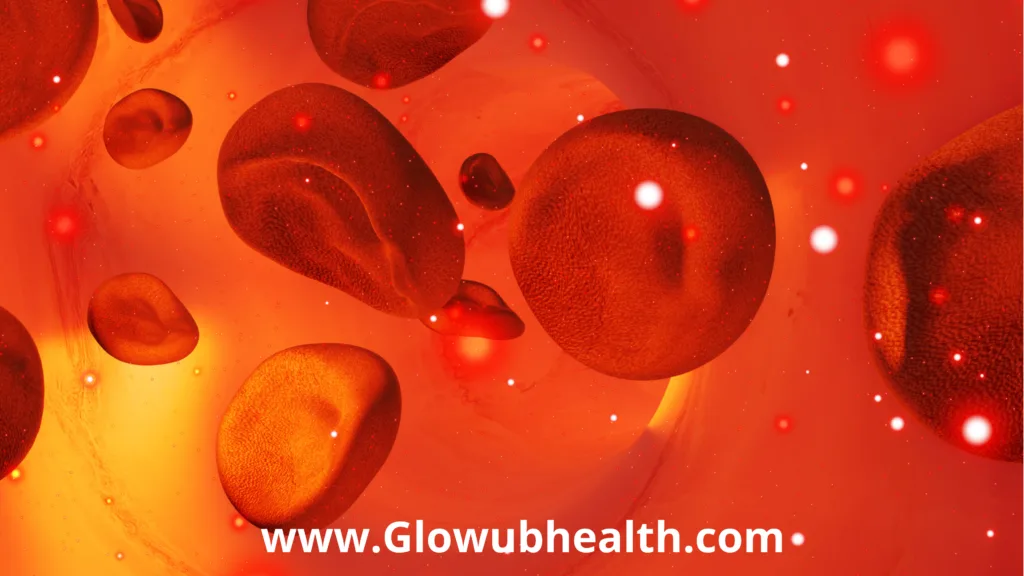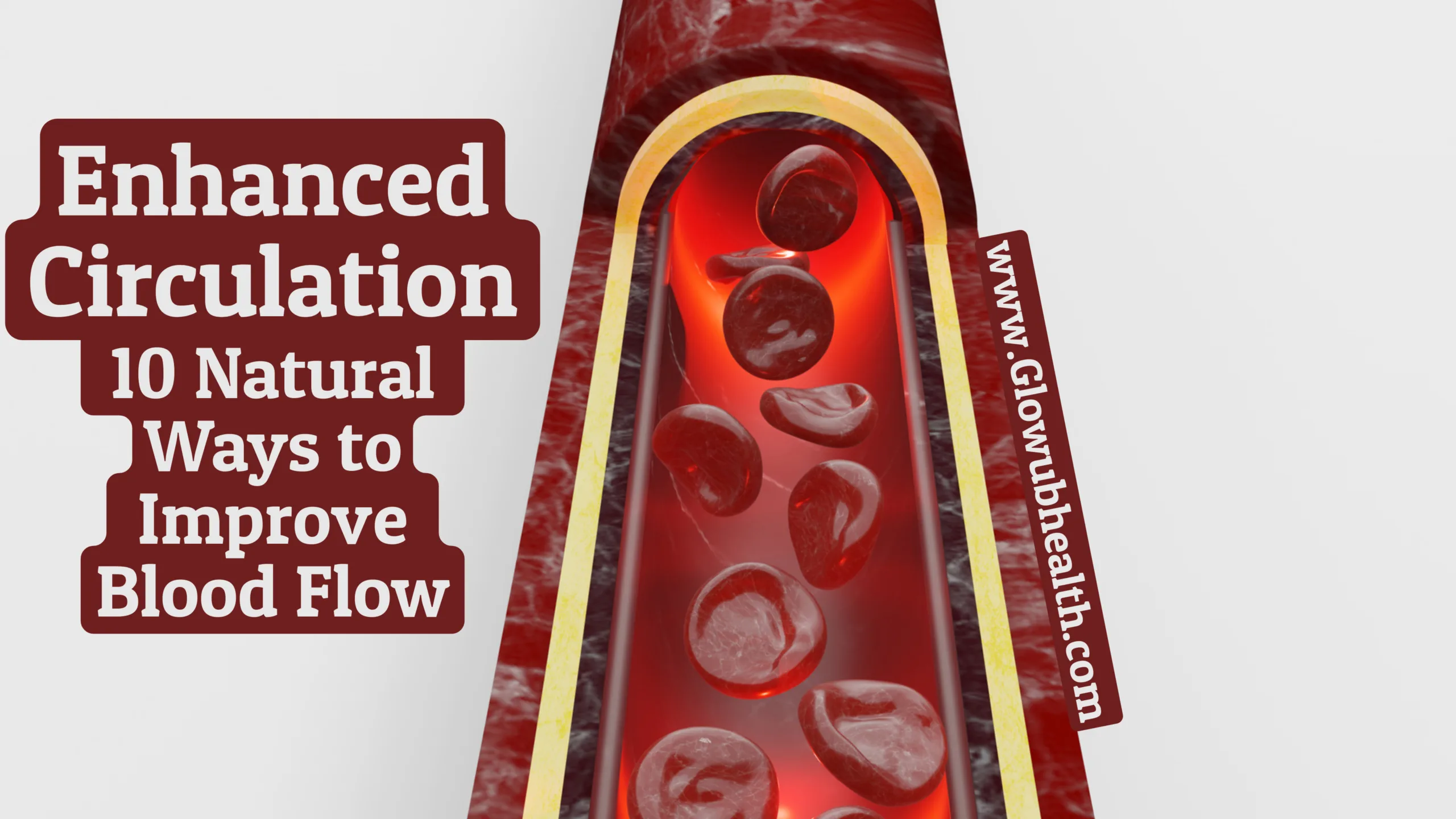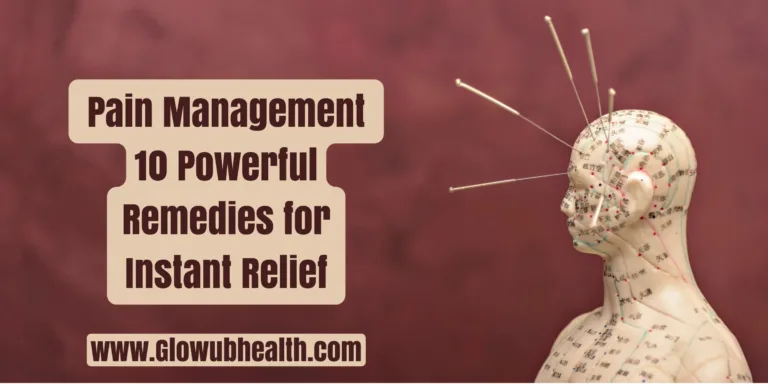Enhanced Circulation : 10 Natural Ways to Improve Blood Flow and Boost Your Health
Good circulation does more than keep your hands and feet warm it plays a vital role in every system of your body. From brain function to digestion and muscle recovery, proper blood flow is key to staying energized and healthy. When your circulation is sluggish, you might notice signs like cold extremities, fatigue, or even slow wound healing all red flags that your body isn’t getting the support it needs.
In this guide, we’ll walk through 10 natural, science-backed ways to enhance blood circulation. These simple lifestyle changes and habits can help you feel more vibrant, prevent long-term health issues, and support a healthier, more active life starting today.
This article is for informational purposes only and should not be taken as medical advice. Always consult with a qualified healthcare professional before starting any health regimen or using natural remedies to improve circulation.

1) Stay Physically Active: Move More, Live Better
Exercise is one of the most effective ways to enhance circulation. It strengthens the heart and promotes efficient blood flow throughout the body. Regular physical activity also encourages the production of nitric oxide, which helps blood vessels relax and expand.
Best Exercises for Circulation Boost
- Cardio Workouts: Activities like running, cycling, and swimming elevate heart rate, improving blood flow.
- Strength Training: Building muscle mass supports better vascular health and boosts metabolism.
- Stretching and Flexibility: Yoga and stretching help maintain the elasticity of blood vessels and reduce tension.
Example: A study in Circulation Research found that moderate-intensity exercise significantly improved blood flow in participants with peripheral artery disease (PAD).
2) Eat a Circulation-Enhancing Diet
Your diet plays a critical role in vascular health. Consuming foods rich in antioxidants, healthy fats, and essential nutrients supports enhanced blood circulation and reduces the risk of arterial damage.
Top Circulation-Boosting Foods
| Food | Nutrient | Benefit |
|---|---|---|
| Leafy Greens | Nitrates | Improves blood vessel function and lowers blood pressure |
| Berries | Antioxidants | Reduces inflammation and strengthens capillaries |
| Fatty Fish | Omega-3 Fatty Acids | Reduces blood clotting and improves heart health |
| Garlic | Allicin | Dilates blood vessels and lowers cholesterol |
| Dark Chocolate | Flavonoids | Improves circulation by reducing oxidative stress |
Tip: Aim for a Mediterranean-style diet rich in whole grains, fruits, vegetables, and healthy fats to naturally enhance blood flow.
3) Stay Hydrated: Water is Life
Dehydration can thicken your blood, making it harder for the heart to pump. Staying hydrated ensures that blood remains fluid and circulates efficiently.
Hydration Tips
- Avoid excessive caffeine and alcohol, which can dehydrate the body.
- Drink 8-10 glasses of water daily.
- Include water-rich foods like cucumbers, watermelon, and celery.
4) Manage Stress : Calm Minds, Healthy Hearts
Stress triggers the release of cortisol, a hormone that can constrict blood vessels and reduce circulation. Managing stress through relaxation techniques can lead to enhanced circulation and overall better health.
Read More: Manage Stress : 7 Effective Techniques to Reduce Daily Tension
Effective Stress-Relief Techniques
- Meditation: Helps calm the nervous system and reduces cortisol levels.
- Deep Breathing: Increases oxygen intake, promoting better circulation.
- Mindfulness: Encourages relaxation and emotional balance.
Personal Story: After incorporating daily meditation, I noticed an improvement in my energy levels and fewer instances of cold hands and feet—classic signs of improved circulation.
5) Get Regular Massages: Touch Therapy for Circulation
Massage therapy stimulates blood flow by promoting the movement of blood and lymph fluid. It also helps to relieve muscle tension, which can restrict circulation.
Types of Massage for Circulation
- Swedish Massage: Focuses on relaxing muscles and improving overall circulation.
- Deep Tissue Massage: Targets deeper muscle layers and releases tension.
- Reflexology: Focuses on pressure points in the feet and hands, promoting circulation throughout the body.
Research Insight: A study published in the Journal of Alternative and Complementary Medicine found that massage therapy significantly improved circulation in people with chronic pain.
6) Use Heat Therapy: Warming Up for Better Flow
Applying heat to the body helps dilate blood vessels, promoting better circulation and relieving muscle tension.
Heat Therapy Options
| Method | Benefit | How to Use |
|---|---|---|
| Warm Baths | Relaxes muscles, dilates vessels | Soak for 20-30 minutes in warm water |
| Heating Pads | Targets specific areas | Apply to stiff or sore muscles |
| Sauna Sessions | Improves overall circulation | Use for 15-20 minutes per session |
7) Quit Smoking: Clear the Way
Smoking damages blood vessels and impairs circulation by causing plaque buildup and arterial stiffening. Quitting smoking can lead to significant improvements in vascular health and reduce the risk of cardiovascular diseases.
Tips for Quitting Smoking
- Seek professional help if needed.
- Join a support group.
- Use nicotine replacement therapies.
8) Incorporate Herbal Remedies: Nature’s Gift to Circulation
Several herbs have properties that promote renew enhanced circulation by dilating blood vessels and improving blood flow.
Read More: Herbal Remedies : 10 Effective Ways to Boost Your Immune System Naturally
Top Circulation-Boosting Herbs
- Ginkgo Biloba: Improves circulation to the brain and extremities.
- Cayenne Pepper: Contains capsaicin, which stimulates blood flow.
- Ginger: Reduces inflammation and promotes healthy circulation.
- Turmeric: Contains curcumin, known for its anti-inflammatory properties.
Example: A study in Phytotherapy Research highlighted turmeric’s role in reducing arterial stiffness and improving blood flow.
9) Maintain a Healthy Weight
Carrying excess weight, particularly around the abdomen, can lead to increased pressure on the heart and blood vessels. This added strain forces the heart to work harder to pump blood, which can compromise circulation and increase the risk of cardiovascular issues such as high blood pressure, atherosclerosis, and venous insufficiency.
Read More: Maintaining Weight Loss : 12 Proven Strategies for Long-Term Success
How Excess Weight Affects Circulation
- Increased Vascular Resistance: Extra fat tissue requires more blood supply, which increases the workload on the heart and raises vascular resistance, slowing down blood flow.
- Inflammation and Plaque Buildup: Being overweight or obese often leads to chronic low-grade inflammation, contributing to arterial stiffness and plaque buildup, which narrows blood vessels and impedes blood flow.
- Venous Insufficiency: Excess weight can compress veins, especially in the legs, leading to conditions like varicose veins and swelling (edema).
Tips for Maintaining a Healthy Weight
- Adopt a Balanced Diet: Focus on whole, nutrient-dense foods like fruits, vegetables, lean proteins, and whole grains. Limiting processed foods and sugary snacks can help manage calorie intake.
- Engage in Regular Exercise: Aim for at least 150 minutes of moderate-intensity exercise per week, including a mix of cardio and strength training. Physical activity not only helps with weight loss but also improves circulation directly.
- Monitor Portion Sizes: Eating appropriate portions can prevent overeating and support a gradual, sustainable weight loss or maintenance.
- Stay Hydrated: Drinking enough water can help manage appetite and boost metabolism.
- Seek Support: Joining a weight management program or working with a dietitian can provide personalized strategies for achieving and maintaining a healthy weight.
Case Study Insight
A study published in the Journal of the American Heart Association found that even a modest weight loss of 5-10% of body weight significantly improved blood vessel function and overall circulation in overweight individuals.
By maintaining a healthy weight, you not only reduce the strain on your cardiovascular system but also support optimal oxygen and nutrient delivery throughout your body. This contributes to higher energy levels, improved mobility, and a lower risk of chronic diseases.
10) Wear Compression Garments: Supportive Solutions
Compression garments help prevent blood from pooling in the legs and promote better circulation, especially for those who stand or sit for extended periods.
Tip: Compression socks are particularly helpful for people with varicose veins or those who travel frequently.
Conclusion
Achieving enhanced circulation is essential for overall health and vitality. By incorporating these natural strategies, you can boost your blood flow, increase energy, and reduce the risk of chronic conditions. Small changes in your lifestyle—like regular exercise, a healthy diet, and stress management—can lead to significant improvements in circulation and well-being.
FAQ
1. What is enhanced circulation, and why is it important?
Enhanced circulation refers to the efficient movement of blood throughout the body, delivering oxygen and nutrients to tissues and organs while removing waste products. Good circulation is crucial for overall health, energy levels, wound healing, and reducing the risk of cardiovascular diseases.
2. How can I naturally improve my blood circulation?
You can naturally boost circulation through:
-Regular exercise (e.g., cardio, strength training, yoga)
-A balanced diet rich in circulation-enhancing foods (leafy greens, fatty fish, garlic)
-Staying hydrated
-Managing stress through meditation and breathing exercises
-Using heat therapy and getting massages
-Maintaining a healthy weight
-Incorporating herbal remedies like ginger and turmeric
3. What are common signs of poor circulation?
Symptoms of poor circulation include:
-Cold hands and feet
-Numbness or tingling in extremities
-Swelling in legs, ankles, or feet
-Muscle cramps or pain
-Fatigue and lack of energy
-Slow healing of wounds
If you experience persistent symptoms, consult a healthcare provider.
4. Can stress affect circulation?
Yes, chronic stress can negatively impact circulation. It causes the release of hormones like cortisol, which can constrict blood vessels, reduce blood flow, and increase blood pressure. Managing stress through relaxation techniques, mindfulness, and regular exercise can help improve circulation.
5. Are there specific foods that enhance blood circulation?
Yes, certain foods are known to boost circulation, including:
–Leafy greens (rich in nitrates)
-Berries (high in antioxidants)
–Fatty fish (omega-3 fatty acids)
-Garlic (contains allicin, which dilates blood vessels)
-Dark chocolate (flavonoids improve vessel function)
6. Can herbal supplements help improve circulation?
Herbal supplements like ginkgo biloba, cayenne pepper, ginger, and turmeric can support enhanced circulation by promoting blood vessel dilation and reducing inflammation. However, consult a healthcare provider before starting any supplement, especially if you have existing health conditions.






